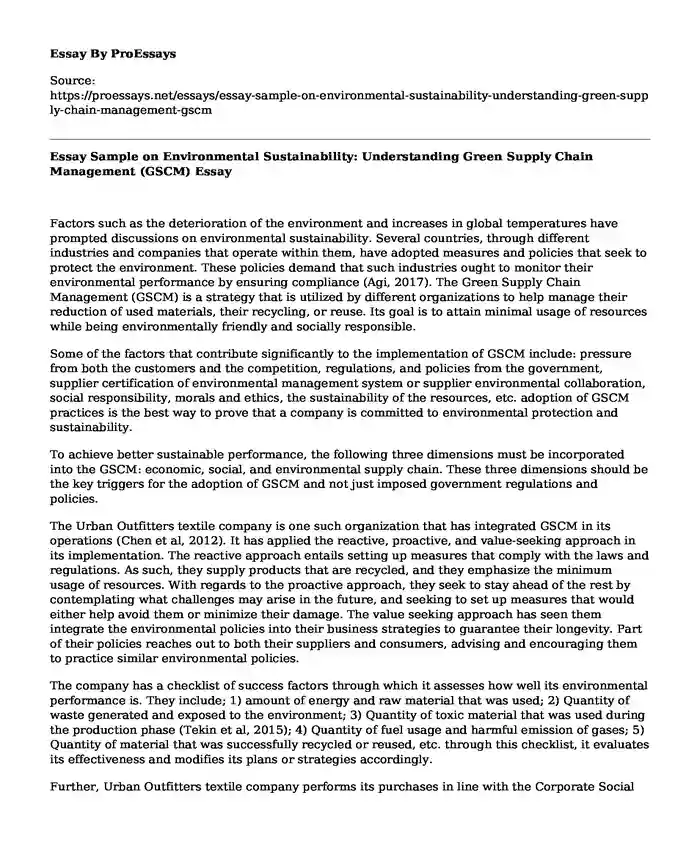Factors such as the deterioration of the environment and increases in global temperatures have prompted discussions on environmental sustainability. Several countries, through different industries and companies that operate within them, have adopted measures and policies that seek to protect the environment. These policies demand that such industries ought to monitor their environmental performance by ensuring compliance (Agi, 2017). The Green Supply Chain Management (GSCM) is a strategy that is utilized by different organizations to help manage their reduction of used materials, their recycling, or reuse. Its goal is to attain minimal usage of resources while being environmentally friendly and socially responsible.
Some of the factors that contribute significantly to the implementation of GSCM include: pressure from both the customers and the competition, regulations, and policies from the government, supplier certification of environmental management system or supplier environmental collaboration, social responsibility, morals and ethics, the sustainability of the resources, etc. adoption of GSCM practices is the best way to prove that a company is committed to environmental protection and sustainability.
To achieve better sustainable performance, the following three dimensions must be incorporated into the GSCM: economic, social, and environmental supply chain. These three dimensions should be the key triggers for the adoption of GSCM and not just imposed government regulations and policies.
The Urban Outfitters textile company is one such organization that has integrated GSCM in its operations (Chen et al, 2012). It has applied the reactive, proactive, and value-seeking approach in its implementation. The reactive approach entails setting up measures that comply with the laws and regulations. As such, they supply products that are recycled, and they emphasize the minimum usage of resources. With regards to the proactive approach, they seek to stay ahead of the rest by contemplating what challenges may arise in the future, and seeking to set up measures that would either help avoid them or minimize their damage. The value seeking approach has seen them integrate the environmental policies into their business strategies to guarantee their longevity. Part of their policies reaches out to both their suppliers and consumers, advising and encouraging them to practice similar environmental policies.
The company has a checklist of success factors through which it assesses how well its environmental performance is. They include; 1) amount of energy and raw material that was used; 2) Quantity of waste generated and exposed to the environment; 3) Quantity of toxic material that was used during the production phase (Tekin et al, 2015); 4) Quantity of fuel usage and harmful emission of gases; 5) Quantity of material that was successfully recycled or reused, etc. through this checklist, it evaluates its effectiveness and modifies its plans or strategies accordingly.
Further, Urban Outfitters textile company performs its purchases in line with the Corporate Social Responsibility (CSR) principles, thus helping in spreading the concept of CSR across its consumers and suppliers all over. Ultimately, GSCM is realized progressively.
Owing to the increasing nature of competition, as well as globalization, several companies have been forced to incline towards environmental sustainability to keep up. As such, more industries are adopting CSR principles and integrating GSCM in their operations. The successful adaptation and incorporation of social and healthy environmental practices help these industries realize economic benefits through a reduction in the costs they incur, increasing their productivity and boosting their corporate reputation.
References
Agi, M.A.; Nishant, R. Understanding influential factors on implementing green supply chain management practices: An interpretive structural modelling analysis. J. Environ. Manag. 2017, 188, 351–363.
Chen, C., Shih, H., Shyur, H., & Wu, K. (2012, July 12). A business strategy selection of green supply chain management via an analytic network process. Retrieved July 24, 2020, from https://www.sciencedirect.com/science/article/pii/S0898122112004439
Tekin, E., Erturk, A., & Tozan, H. (2015, April 15). Corporate Social Responsibility in Supply Chains. Retrieved July 24, 2020, from https://www.intechopen.com/books/applications-of-contemporary-management-approaches-in-supply-chains/corporate-social-responsibility-in-supply-chains
Cite this page
Essay Sample on Environmental Sustainability: Understanding Green Supply Chain Management (GSCM). (2023, Oct 23). Retrieved from https://proessays.net/essays/essay-sample-on-environmental-sustainability-understanding-green-supply-chain-management-gscm
If you are the original author of this essay and no longer wish to have it published on the ProEssays website, please click below to request its removal:
- Skills for Workplace Success Paper Example
- Assignment Example on Microsoft Case
- Risk Management in Chain Supply - Essay Sample
- Essay Sample on Companies' Values: How to Create an Emotional Appeal That Resonates
- Essay on Creating Social Platforms: Urban Design & Public Spaces
- Shareholder vs. Stakeholder Theory: A Corporate Governance Debate - Essay Sample
- Paper Sample on Adapting to Change: Overcoming Challenges in the Business World







